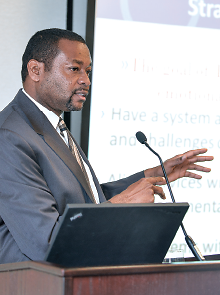Redirecting a billion-dollar municipal mental health system is like steering a supertanker: you have to know where you’re going, and a lot of machinery has to work together well.
Philadelphia’s public mental health system is following a similar course as it advances towards a recovery model, said psychologist Arthur Evans, Ph.D., commissioner of the city’s Department of Behavioral Health and Intellectual disAbility Services (DBHIDS). “All the work we’ve done, we’ve done together as providers, consumers, and administrators.”
Reconstituted from three prior city agencies, the DBHIDS covers mental health and substance abuse treatment for adults and children in settings ranging from acute-care hospitals to private practices, Evans told Psychiatric News. The department helps to develop and set public policy around behavioral health issues but does not offer mental health services. Rather, it contracts for services with outside agencies and providers.
Philadelphia set out on its present course in the early 1990s, but Evans has accelerated changes since he was appointed in 2004, and his vision of a recovery-oriented system has guided the department.
Rather than opting to make incremental changes in the existing system, Evans chose a “transformational” strategy that linked a public-health model with individual care.
“In our old system, the primary focus was on the treatment of symptoms,” he said. “People would get ‘fixed,’ then discharged. We were treating a chronic disease with an acute-disease model.”
Goal Is Recovery, not Symptom Reduction
The DBHIDS rejected this passive model.
“Our first goal was to optimize treatment based on strong empirical evidence but also to individualize treatment with regard to co-occurring conditions and cultural issues,” said Evans. “Our goal isn’t just symptom reduction. It’s recovery, and since people recover in a community, we also need a continuum of recovery support services like housing, education, social support, and employment.”
In Evans’ view, clinicians, family, community members, and peers would serve together as pillars of long-term support for a patient.
“The whole system is on a recovery journey, just like the people it serves,” said psychiatrist Lawrence Real, M.D., medical director of DBHIDS contractor Horizon House in Philadelphia, in an interview with Psychiatric News.
Evans changed the incentives in the system, especially for psychiatrists, Real noted. Payment rates for psychiatrists were raised and a differential for child psychiatrists added.
“This is now a system that really values and respects the contributions of psychiatrists,” Real emphasized. “Evans hired and empowered a highly talented psychiatrist [Chief Medical Officer Matthew Hurford, M.D.] to work hand-in-hand with him in transforming the system. And psychiatrists are well-compensated, not only for writing prescriptions but for the time they spend engaging with and educating the people they serve.”
The department also draws on social-science research to guide contracting through its Evidence-based Practice and Innovation Center (EPIC), said Hurford, in an interview. “We started by thinking about the system’s needs, evaluating what the literature said about the best ways to meet those needs, and then making changes in practice.”
A key ingredient in that process was changing ways of working with providers, using implementation science.
“We’re not just contracting for evidence-based care,” he said. “We’re really contracting for meaningful outcomes” at every step in the process.
Peers Play Crucial Role
DBHIDS draws on other resources too. Individuals in recovery from mental illness or substance abuse find a place in the department’s operations at every level, from the main office to the clinic, said Evans. These peers welcome newcomers to community drop-in sites or clinics and follow them afterwards to keep them engaged in treatment. Peers can inspire people in recovery with their own stories, said Evans.
The department has also built alliances with communities throughout the city, linking behavioral health providers with religious groups, arts organizations, and others. Those nonclinical entities provide a sense of community, critical social support, and a way to connect people to services when needed (Psychiatric News, November 15, 2013).
DBHIDS has also expanded two programs at the front end of the mental health process, said Samantha Matlin, Ph.D., special advisor to the commissioner and senior director for health promotion.
One is the expanded implementation of mental health first-aid training around the city to groups like the police, school district, child welfare unit, and Red Cross, she said in an interview. Even commercial businesses have approached the department about training employees. Philadelphia’s Drexel University is helping to evaluate the program, with first results due later this year.
Recently, the department began a behavioral health screening program using an automated kiosk in a local grocery store.
“It’s been so successful that libraries and drugstores have been calling to get it into their own spaces,” she said. However, the DBHIDS will expand this form of screening carefully because its growth has to be matched with available evaluation and treatment resources.
In addition, police training has sharply reduced bad interactions with people with mental illness in the city. Volunteer community crisis teams respond after violence or disaster occurs, working with faith communities to educate clergy about mental health and where congregants can get help, said Evans.
He also instituted changes to maintain standards and keep staff and providers focused on the broader recovery model. “We developed a set of practice guidelines to drive all services and then based our credentialing process on an understanding of those policies and procedures,” he said.
Over his 10 years in Philadelphia, Evans has concluded that barriers to change in mental health agencies are largely self-imposed. But that shouldn’t stop the process, he said. “I’d say 80 percent of this work is conceptual, about how we look at people. If I don’t believe this person can recover, no amount of resources can change that.” ■
More on Philadelphia’s Department of Behavioral Health and Intellectual disAbility Services is available
here. Read about the grocery-store-based screenings
here.

